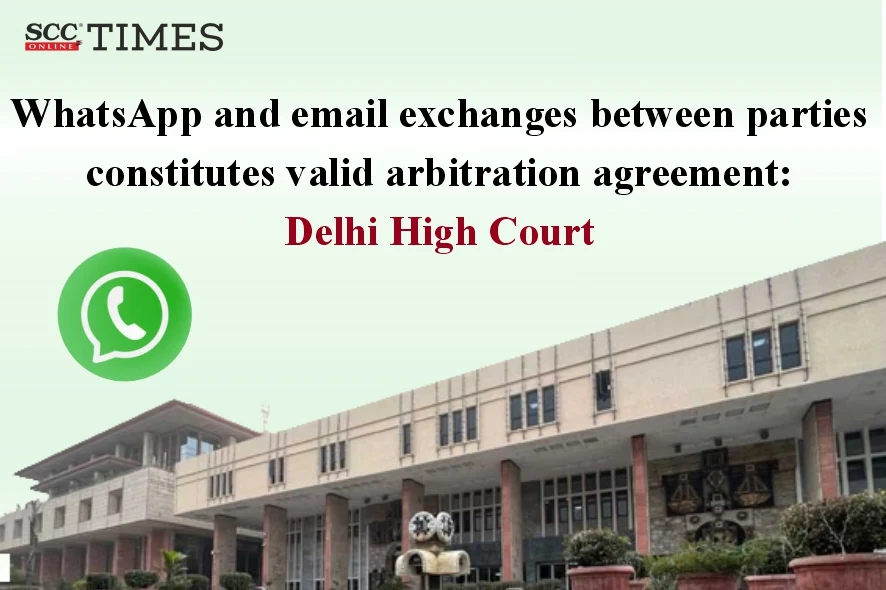Delhi High Court: In a petition filed under Section 9 of the Arbitration and Conciliation Act, 1996 (Arbitration Act) wherein the petitioner sought an interim order for attachment of properties of respondents to the tune of Rs 23.34 Crores, the Single Judge Bench of Jasmeet Singh, J*, opined that since orders of attachment affect the financial health of the company, they are not passed as a routine and thus, dismissed the petition.
While answering the issue raised by the respondents regarding the validity of the arbitration agreement, the Court noted that WhatsApp and email correspondences would constitute a binding and valid arbitration agreement.
Background:
Belvedere (Petitioner), a company incorporated in UAE, was engaged in providing bespoke services including sale of coal. SM Niryat Pvt. Ltd (SMN) entered discussions with the petitioner over WhatsApp for sale of coal. On 13-10-2022, the petitioner shared the Standard Coal Trading Agreement (SCoTA) with SMN that contained an arbitration clause.
Despite repeated reminders sent by the petitioner over email and WhatsApp, SMN failed to make the advance payment and to submit a signed copy of the contract. Subsequently, on 15-11-2025, SMN cancelled the deal. In accordance with terms of the SCoTA, Belvedere invoked arbitration under SIAC and sought damages for wrongful termination of contract and costs of arbitration.
During the proceedings, Respondent 1 submitted a letter to SIAC asserting that SMN had been amalgamated with Respondent 1 and ceased to exist. Respondent 1 also denied any claims of the petitioner.
Respondent 1 had argued that no valid arbitration agreement existed between the parties since the SCoTA was never formally concluded. They also contended that the Court did not possess the territorial jurisdiction to entertain the instant petition. Respondent 1 had further averred that the damages were unliquidated and were not debt and therefore could not be secured.
The Court in the instant petition had deliberated upon three issues:
- Whether the documents and correspondence showed a valid arbitration agreement?
- Whether the Court had territorial jurisdiction to entertain and try the instant petition?
-
Whether respondents should be directed to furnish security to the extent of USD 2,777,000?
Analysis, Law and Decision
The Court noted that the exchanges between the parties via WhatsApp and email clearly showed that the petitioner had forwarded the SCoTA to SMN and a representative of SMN had assured the petitioner that the contract would be sent after being signed and stamped.
The Court referred to Section 7(4)(b) of the Arbitration Act which stated that for an arbitration agreement to be valid, it must be contained in the communication that provided a record of the agreement. It must form a part of an exchange between parties, however, it’s not necessary that the contract must be concluded between the parties.
Therefore, the Court held that since SCoTA contained the arbitration clause, correspondence acknowledging the implementation of terms of SCoTA constituted a valid arbitration agreement between parties. Thus, the Court held that the WhatsApp and email correspondences between the parties constituted a valid arbitration agreement.
On the question of territorial jurisdiction, the Court held that there was no reason for this Court to have jurisdiction over the matter. The petitioner was incorporated in UAE, the respondent company’s registered office was in Kolkata, the deal was negotiated through brokers in Singapore and the contract was repudiated in Kolkata. No cause of action arose in Delhi, and therefore the Court held that the this Court would not have territorial jurisdiction over the issue.
The Court further noted that the claim for damages for breach of contract would crystallize into debt only after it was adjudicated upon by an adjudicating authority. At the instant stage, the petitioner only had a claim for damages and not debt due. The Court also opined that the petitioner had to show that the defendant had an intent to obstruct or delay the execution of a decree of the Court which would justify the passing of an interim order for attachment of his property. The Court further held that an order under Section 9 of the Arbitration Act as sought by the petitioner could not be passed unless the conditions under Order 38 Rule 5 of the Civil Procedure Code, 1908 were fulfilled.
Thereafter, the Court held that since there was nothing on the records to show that Respondent 1 had any intent to obstruct or delay the execution of a decree, an order for attachment of properties could not be granted.
Accordingly, the petition was dismissed.
[Belvedere Resources DMCC v. OCL Iron and Steel Ltd., OMP(I) COMM No. 397 of 2024, decided on 1-7-2025]
Judgement authored by- Justice Jasmeet Singh
Advocates who appeared in this case:
For the Petitioner: Gauhar Mirza, Shivi Chola, Advocates
For the Respondents: Krishnaraj Thaker (Senior Advocate), Anand Sukumar, S Sukumaran, Bhupesh Kumar, Ruche Anand, Advocates








